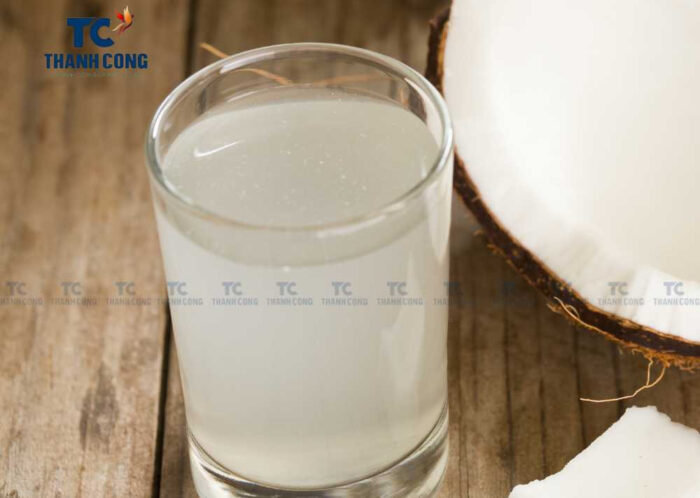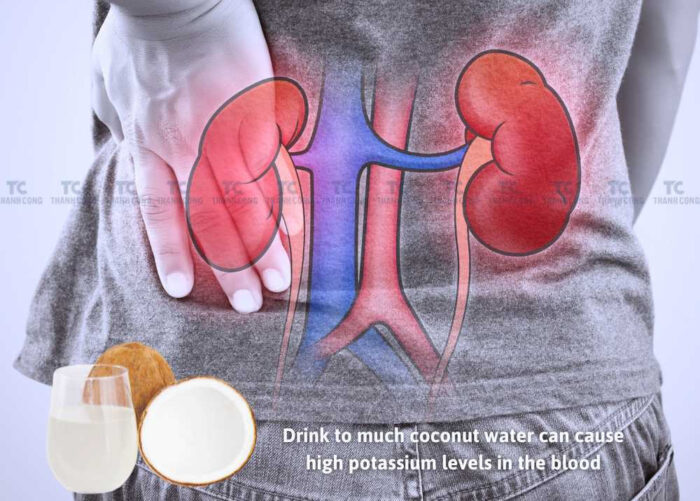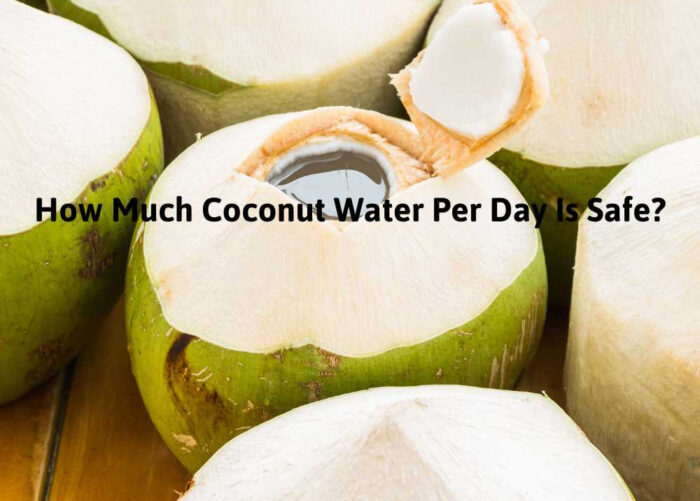Coconut water is favored by many people not only for its cooling properties but also for providing many beneficial minerals for you. But, what happens if i drink coconut water everyday? It’s important to understand the potential advantages and disadvantages of drinking coconut water every day and to consume it in moderation as part of a balanced diet.
Contents
What Micronutrients Does Coconut Water Contain?
Coconut water is a good source of several micronutrients, including:
- Potassium: Coconut water is an excellent source of potassium, with one cup (240 ml) containing about 600 mg of potassium, about 13% of the recommended intake. Potassium regulates blood pressure, maintains fluid balance, and supports muscle and nerve function.
- Magnesium: Coconut water is also a good source of magnesium, with one cup containing about 60 mg, which is about 15% of the recommended intake. Magnesium is important for muscle and nerve function, bone health, and energy production.
- Calcium: Coconut water contains about 24 mg of calcium per cup, about 2% of the recommended intake. Calcium is important for bone health, muscle function, and nerve function.
- Sodium: Coconut water contains about 252 mg of sodium per cup, about 11% of the recommended intake. Sodium is important for maintaining fluid balance and supporting nerve and muscle function.
- Vitamin C: Coconut water contains some vitamin C, with one cup providing about 10% of the daily recommended intake. Vitamin C is important for immune function, wound healing, and collagen production.
- Other micronutrients: Coconut water also contains smaller micronutrients like zinc, copper, and manganese.
It’s important to note that the exact nutrient content of coconut water can vary depending on the variety of coconut, the processing method, and other factors.

What Happens If I Drink Coconut Water Everyday?
Drinking coconut water in a reasonable amount can provide numerous health benefits, as it is rich in electrolytes, vitamins, minerals, and antioxidants. Some of the potential benefits of drinking coconut water regularly include the following:
- Hydration: Coconut water is an excellent source of hydration, as it contains natural electrolytes that can help replenish fluids lost through sweating.
- Improved digestion: Coconut water contains fibre, which can help improve digestion and prevent constipation.
- Lower blood pressure: Some studies have suggested that drinking coconut water can help lower blood pressure due to its high potassium content.
- Improved heart health: Coconut water has been shown to reduce the risk of heart disease by decreasing cholesterol levels and improving blood lipid profiles.
- Boosted immunity: Coconut water contains immune-boosting antioxidants and cytokines that can help protect the body from infections and diseases.

Is Too Much Coconut Water Bad for You?
Although drinking coconut water brings many benefits but it’s worth noting that drinking too much coconut water can also have some adverse effects, such as high potassium levels in the blood, which can be dangerous for people with kidney problems.
So, as with anything, moderation is key. It’s also important to note that coconut water should not be used as a substitute for medical treatment or advice, and if you have any health concerns, you should consult with your healthcare provider.

What Are The Disadvantages of Drink Coconut Water Everyday?
While drinking coconut water every day can provide many health benefits, there are also some potential disadvantages to consider:
- High in potassium: Coconut water is high in potassium, and drinking excessive amounts can lead to hyperkalemia, a condition with too much potassium in the blood. This can be dangerous, especially for people with kidney problems or those taking certain medications.
- High in sugar: While natural, coconut water contains natural sugars that can add up if consumed in large quantities. This can be problematic for people with diabetes or those trying to control their sugar intake.
- Not a complete source of nutrition: While coconut water is a good source of hydration and contains some nutrients, it should be considered the only food source. It lacks essential nutrients like protein and fat, which are necessary for a balanced diet.
- Expensive: Depending on your location, coconut water can be relatively expensive compared to other beverages.
- Allergic reactions: Some people may be allergic to coconut water, and consuming it can cause allergic reactions like itching, hives, or anaphylaxis.
It’s important to note that these disadvantages are usually only relevant if coconut water is consumed in large quantities or if you have specific health concerns or allergies. In moderation, coconut water is generally safe and beneficial for most people.

How Much Coconut Water Per Day Is Safe?
The amount of coconut water that is safe to consume daily depends on various factors, including your age, gender, health status, and activity level. Drinking one to two cups (240-480 ml) of coconut water daily is considered safe for most people.
However, suppose you have kidney problems or are taking medications that affect your potassium levels. In that case, you should talk to your healthcare provider before consuming coconut water or other high-potassium foods or beverages. In some cases, drinking too much coconut water can lead to hyperkalemia, a condition with too much potassium in the blood, which can be dangerous.
It’s also worth noting that coconut water should not be used as a substitute for medical treatment or advice, and if you have any health concerns, you should consult with your healthcare provider.

In short, while drinking coconut water offers many benefits, it can also have many harmful effects. Therefore, when drinking coconut water, you should consider drinking an appropriate amount to avoid complications. Hopefully, with the information for the “what happens if i drink coconut water everyday” question above, we have helped you better understand this issue. I wish you good health!
Reach out to us today to learn more about our products or to place a wholesale order. We look forward to connecting with you!
- Thanh Cong Handicraft Co., Ltd
- Email: [email protected]
- Tel/WhatsApp: +84967485411
Explore our Products Collection for more choices! Contact Us!
Contact Us!


